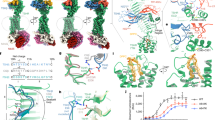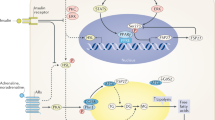Abstract
THYROID hormones influence the lipolytic response of rat adipocytes to adrenaline, glucagon, ACTH and TSH1,2. Krishna, Hynie and Brodie3 provided evidence that hyperthyroidism is followed by an increase in the nor-adrenaline-sensitive adenylate cyclase without any change in phosphodiesterase activity. Subsequent investigations have shown that adenylate cyclase activity measured as fluoride stimulated activity is unchanged in hyperthyroidism4 and confirmed that phosphodiesterase activity is normal4,5. Since the amount of hormone-sensitive lipase does not appear to be increased in hyperthyroidism3 these studies indicate an action of thyroid hormones either on the hormone receptors for lipolytic hormones or on the transmission of the hormonal message from the receptors to adenylate cyclase. This prompted the present study in which we found that hyperthyroidism was associated with an increased binding of glucagon to fat cells as well as increased glucagon stimulated production of cyclic AMP and glycerol.
This is a preview of subscription content, access via your institution
Access options
Subscribe to this journal
Receive 51 print issues and online access
$199.00 per year
only $3.90 per issue
Buy this article
- Purchase on Springer Link
- Instant access to full article PDF
Prices may be subject to local taxes which are calculated during checkout
Similar content being viewed by others
References
Goodman, H. M., and Bray, G. A., Am. J. Physiol., 210, 1053–1058 (1966).
Vaughan, M., J. clin. Invest., 46, 1482–1491 (1967).
Krishna, G., Hynie, S., and Brodie, B. B., Proc. natn. Acad. Sci. U.S.A., 59, 884–889 (1968).
Challoner, D. R., and Allan, D. O., Metabolism, 19, 480–487 (1970).
Caldwell, A., and Fain, J. N., Endocrinology, 89, 1195–1204 (1971).
Gliemann, J., Diabetologia, 3, 382–388 (1967).
Gammeltoft, S., and Gliemann, J., Biochim. biophys. Acta, 320, 16–32 (1973).
Sonne, O., Gliemann, J., and Gammeltoft, S., Acta Endocr. Copenh., Suppl. 177, 274 (1973).
Elkeles, R. S., Lazarus, J. H., Siddle, K., and Campbell, A. K., Clin. Sci. molec. Med., 48, 27–31 (1975).
Madsen, S., Nistrup, Badawi, I., and Christensen, S. E., Acta Endocr. Copenh., Suppl. 199, 333 (1975).
Guttler, R. B., Shaw, J. S., Otis, C. L., and Nicoloff, J. T., J. clin. Endocrinol. Metab., 41, 707–711 (1975).
Rosenqvist, U., Acta Med. scand., 192, 353–359 (1972).
Kunos, G., Vermes-Kunos, I., and Nickerson, M., Nature, 250, 779–781 (1974).
Tata, J. R., Nature, 257, 740–741 (1975).
Madsen, S., Nistrup Badawi, I., and Skovsted, L., Acta Endocr. Copenh., 81, 208–214 (1976).
Laurell, S., and Tibbling, G., Clin. chim. Acta. 13, 317–322 (1966).
Author information
Authors and Affiliations
Rights and permissions
About this article
Cite this article
MADSEN, S., SONNE, O. Increase of glucagon receptors in hyperthyroidism. Nature 262, 793–795 (1976). https://doi.org/10.1038/262793a0
Received:
Accepted:
Published:
Issue Date:
DOI: https://doi.org/10.1038/262793a0
This article is cited by
-
Investigation of the usefulness of the plasma adenosine 3′, 5′ — cyclic monophosphate response to glucagon in thyroid disease
Journal of Endocrinological Investigation (1980)
-
Calorigenic effects of noradrenaline and glucagon on white adipocytes in cold- and heat-acclimated rats
Pfl�gers Archiv European Journal of Physiology (1979)
-
Hyperthyroidism: Specifically increased response to central NA-(?-)receptor stimulation and generally increased monoamine turnover in brain
Journal of Neural Transmission (1977)
Comments
By submitting a comment you agree to abide by our Terms and Community Guidelines. If you find something abusive or that does not comply with our terms or guidelines please flag it as inappropriate.



